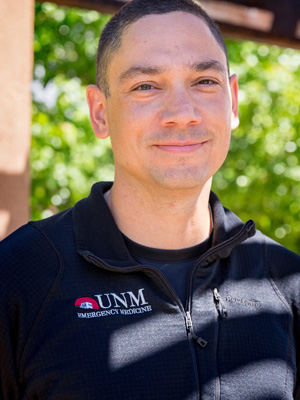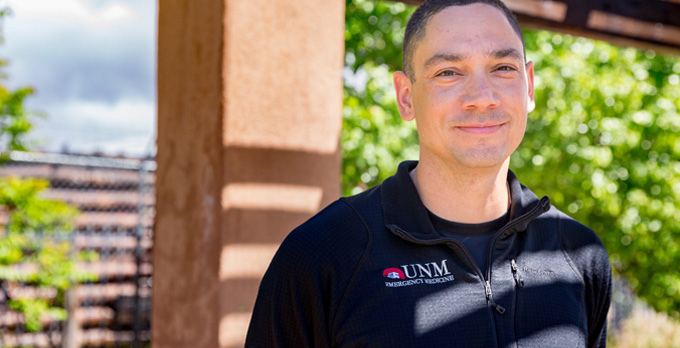New Mexicans are no strangers to hot and dry weather, but the summer of 2023 has brought temperatures and conditions that even the most seasoned desert-dwellers might not be used to. While the triple-digit heat is finally easing, there are still some hot days ahead, prompting many to crank their air conditioning and stay indoors, but some cannot avoid going outside. Experts at The University of New Mexico say hydration is key—but it’s not just about drinking water.
Jon Femling, MD, PhD, is the clinical vice chair in the UNM School of Medicine Emergency Medicine Department and the medical director of the UNM Hospital Adult Emergency Department. During a recent study on hikers in the Grand Canyon, his team found that what people eat is just as important as what they drink in order to stay hydrated.

I helped take care of a patient once who was seizing on the side of the trail because they had gotten their water and salt balance wrong. They were drinking water, but they weren’t eating enough salty snacks, and it really put them in danger.
“I helped take care of a patient once who was seizing on the side of the trail because they had gotten their water and salt balance wrong,” Femling said. “They were drinking water, but they weren’t eating enough salty snacks, and it really put them in danger.”
When your body starts to sweat a lot, you’re not just losing water, you’re losing salt and electrolytes, potassium, and other things your body needs. That’s why Femling said salty snacks are important.
It’s about balance, Femling said because heat has a big impact on the way the heart functions.
“If you go outside and you’re not hydrated, what happens is your heart has to squeeze extra,” he said. “It goes faster. It squeezes harder to try and move all that blood around. So when it’s really hot, you don’t exercise as well, because now you’ve made it harder for your pump to do what it needs to do, even if you’re resting.”
They all agree that hydration is key during the hot summer months, before, during and after outdoor activity. They recommend listening to your body because it will often communicate to you exactly what it needs.
Untreated heat illness can lead to internal organ damage or heart failure. If you experience following symptoms, seek immediate medical attention or call 911.
As you replenish the fluid in your system, Femling said your heart’s pump will return to normal while still allowing you to sweat and cool yourself off. That’s why it’s important not to ignore your body’s craving for water when you’re in the heat. He said if you’re thirsty, drink.
Femling added that officials at the Center for Disease Control and Prevention (CDC) do not necessarily recommend sports drinks to stay hydrated, but Femling does believe they can help in some moderation. Bringing back the topic of “balance,” Femling said drinking too much water can be just as dangerous as not drinking enough.
“Remind yourself every 30 minutes to be like, ‘Hey, am I thirsty? I should actually drink something,’ and don’t ignore that,” he said. “Continue to eat the salty foods, continue to eat the variety of stuff that you brought, but don’t force yourself to drink when you’re not thirsty at all.”
Other UNM health experts recommend drinking fluids slowly and frequently, every 15 to 20 minutes, and avoiding going out during the hottest times of day. That means limiting activity to the early morning and evening.
Heat illness symptoms to watch out for:
- Headaches
- Chills
- Confusion
- Muscle cramping
- Excessive sweating
Tips to remember:
- Drink water only when thirsty
- Sip water slowly, do not gulp
- Eat salty foods
- Avoid going outside in the heat of the day
